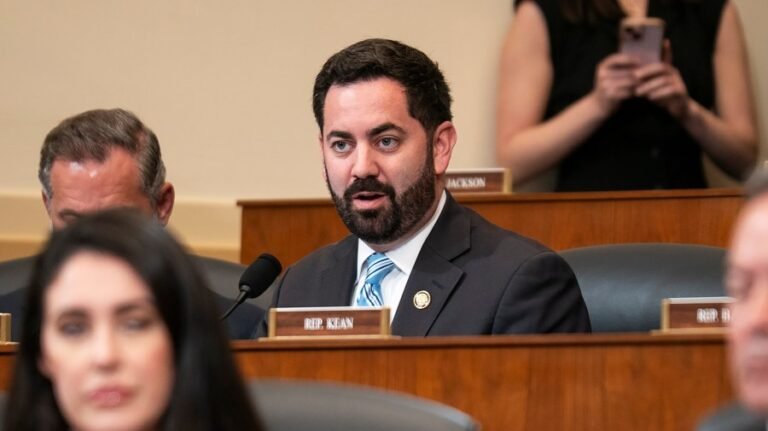
On July 4, amid fanfare and flyovers, President Trump signed his “one big beautiful bill.” The legislation reduces taxes, increases appropriations for the military, border security and Immigration and Customs Enforcement — while cutting spending on Medicaid and the Supplemental Nutritional Assistance Program, better known as food stamps. According to the nonpartisan Congressional Budget Office, the bill’s $4.5 trillion decrease in revenues and $1.2 trillion increase in spending will add $3.3 trillion over the next decade to the already astronomical $36 trillion national debt.
Despite Trump’s claims, the bill is extremely unpopular. Five recent polls found net approval ratings ranging from minus-19 percentage points to minus-29 points for the legislation. “The more [Americans] learn about this bill, they hate it just as much,” declared Harry Enten, CNN’s data analyst.
Many Americans haven’t yet realized that the tax cuts and estate tax changes, which disproportionately benefit the wealthy, have been made permanent, while the exemption on workers’ tips and overtime and reductions on taxes to Social Security benefits will expire in 2028. Most are unaware that, in an attempt to minimize Republican losses in the midterms, legislators delayed until 2027 implementation of the Medicaid cuts (which will result in 11.8 million Americans losing their health insurance) and that reductions in the federal share of SNAP costs won’t kick in until 2027.
Opposition from so-called Republican “moderates” and “deficit hawks” initially appeared sufficient to defeat or at least force substantial revisions of the bill. But virtually all of them caved.
For once, Elon Musk had it right. The “big beautiful bill,” Musk wrote, is a “disgusting abomination. Shame on those who voted for it. You know you did wrong. You know it.”
Here are profiles of four Republicans who shelved their principles.
Rep. David Valadao (R-Calif.), whose district contains one of the nation’s highest percentages of Medicaid recipients, stated unequivocally that he would not support legislation “that includes any reduction in Medicaid coverage for vulnerable populations.” Nonetheless, he voted for the House bill. Valadao then expressed concerns about changes in the Senate: “I’ve been clear from the start that I will not support a final reconciliation bill that makes harmful cuts to Medicaid, puts critical funding at risk, or threatens the stability of healthcare providers.”
Although the Senate reduced Medicaid appropriations by almost a trillion dollars and cut almost in half the tax states can impose on private healthcare providers, a “vital stream” of income for the program, Valadao voted for the final bill.
It “was not an easy decision,” Valadao said, but “no piece of legislation is perfect.” The Senate bill, he claimed, “does preserve the program for its intended recipients — children, pregnant women, the disabled and elderly.” And it included a fund to give rural hospitals a few years to adjust to reduced revenues. Going forward, Valadao promised to work hard to identify and mitigate risks.
In December 2024, Rep. Chip Roy (R-Texas) did not accede to President-Elect Trump’s demand that Republicans raise the debt ceiling by $5 trillion dollars. “I’m absolutely sickened,” he proclaimed, “by a party that campaigned on fiscal responsibility and has the temerity to go forward to the American people and say you think this is fiscally responsible.”
This spring, however, Roy voted for the reconciliation bill, which included that $5 trillion increase in the debt ceiling and added trillions to the deficit, after Speaker Mike Johnson (R-La.) agreed to advance implementation of the work requirement in Medicaid from 2029 to 2026. “Mediocre but passable,” he said, the bill still needed “massive improvements if we are to make a dent in our deficit or to change the trajectory of this country.” The Senate “failed us,” Roy claimed. We can “amend it, send it back, fix it … Happy to stay here every day until we get it right.”
Yet within days, Roy announced he was convinced the Trump administration would use executive orders and other legislation “to ameliorate those areas” made worse by the Senate — and voted for the final bill.
Asked about Musk’s characterization of the House bill, Sen Ron Johnson (R-Wis.) replied, “He’s telling the truth.” The legislation doesn’t “bend the deficit curve down. It supports it going up.” Johnson indicated “there’s no way” he would support a bill that sustained this “new normal.” He was untroubled by the president’s threat that anyone who opposed his bill would face a primary challenge: “I’d be happy to be done with politics.”
After meeting with Trump and members of his staff, however, Johnson indicated he was satisfied they were “committed” to reducing federal spending to pre-pandemic levels: “A rigorous effort will soon be announced,” he added, “to review every program and every line of the federal budget, looking for ways to… put America on the path to fiscal sustainability.” Johnson voted for a Senate bill that added about a trillion dollars more to the national debt than the House bill.
After the Senate passed Trump’s bill, a reporter asked Sen. Lisa Murkowski (R-Alaska) about the assertion by Sen. Rand Paul (R-Ky.) that instead of joining him, Sen. Thom Tillis (R-N.C.) and Sen. Susan Collins (R-Maine) to defeat the legislation, she engineered “a bailout for Alaska at the expense of the rest of the rest of the country.” After a long pause, Murkowski, who had “made very clear” in June that “we cannot go forward with a bill that makes cuts to Medicare,” replied, “I know that in many parts of the country there are Americans that are not going to be advantaged by this bill … But when I saw the direction that this is going — you know you can either say, ‘I don’t like it’ and not try to help my state, or you can roll up your sleeves.”
Murkowski used her leverage to delay the requirement that states with high food stamp error rates, including Alaska, contribute more to the cost of benefits. Alaska and Hawaii received waivers of food stamp work requirements based on high unemployment rates in their states. And the bill provided tax relief for whaling boat captains.
“This has been an awful process,” Murkowski explained, “a frantic race to meet an artificial deadline.” As the legislation returned to the House, she expressed her “sincere hope that this is not the final product.” While she had made improvements for Alaska, this bill “is not good enough for the rest of the nation — and we all know it.” It “needs more work across chambers and is not ready for the president’s desk.”
In the months before the 2026 elections, Democrats will almost certainly be quoting Valadao, Roy, Johnson and Murkowski, and making the point that promises by allegedly principled Republican politicians are nothing but “sound and fury, signifying nothing.”
Glenn C. Altschuler is the Thomas and Dorothy Litwin Emeritus Professor of American Studies at Cornell University.






